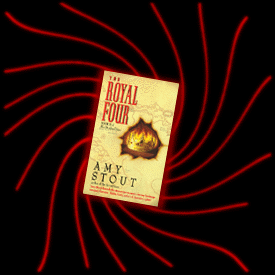 For almost 15 years now, Amy Stout has been working in book publishing. During her ninth year, she was "downsized." "Losing your job is a great way to reevaluate your life," Stout laughs. "Nine years of publishing -- what can you do with it? Nothing! If you're an editor with a specialty, it's hard to get a job not in that specialty -- which means you're looking at that very tiny group of positions for people who edit SF and fantasy. Meanwhile, I started working on a novel." Three months later Stout was hired at what is now Dutton Signet and was soon promoted to executive editor of the Roc Books imprint. But she kept writing The Sacred Seven, the first book in the Saga of the One Land.
For almost 15 years now, Amy Stout has been working in book publishing. During her ninth year, she was "downsized." "Losing your job is a great way to reevaluate your life," Stout laughs. "Nine years of publishing -- what can you do with it? Nothing! If you're an editor with a specialty, it's hard to get a job not in that specialty -- which means you're looking at that very tiny group of positions for people who edit SF and fantasy. Meanwhile, I started working on a novel." Three months later Stout was hired at what is now Dutton Signet and was soon promoted to executive editor of the Roc Books imprint. But she kept writing The Sacred Seven, the first book in the Saga of the One Land.
Born in West Virginia, Stout grew up in Tampa, Florida, and graduated from the University of South Florida in Tampa in 1982 with one degree in Creative Writing and another in Interdisciplinary Social Sciences. "I had an excellent writing professor who'd been an editor at Knopf," she says. "He was very good at evaluating manuscripts and he gave us a lot of practical approaches to writing -- and he liked science fiction. I came to both SF and fantasy not when I was a kid, but as an adult, more or less. I clearly remember reading Fahrenheit 451 in high school, but I didn't read fantasy until college. I was working in a book store with some people who were into it." Through them she first encounter the works of Tolkien, among others, and was hooked.
"I went to New York City after college," she continues. Within a few months, Stout was working for Asimov's Science Fiction magazine and related publications. She went to Bantam in 1985 and worked there until 1992. "Most of what I learned about fiction I learned as an editor, and came back to writing the other way around. Whatever I know about plotting, characterization, stories, is due to what I saw as an editor. When I worked on Asimov's, I had to read every story going into every issue. I learned what was good or bad, and what had been done to death. It was a great primer course on the genre."
Becoming a writer altered her perspective as an editor, if only a little. "I started feeling guiltier when I rejected people's manuscripts. I had gotten to the place where I could be totally hard-hearted about it. Now I'm back to reading more than I need to, given I know I'm gonna reject this baby anyway. Whereas before, I'd say 'You're gone!' after page one and a half. I think that's the only change." Yet as a writer she had to struggle against her editor self. "I had to learn not to edit myself so hard that I couldn't get anything done. My first drafts are terrible. I don't write in order, I write whoever's talking to me that day. I'm not one of those who enjoys writing," she declares. "I enjoy having written."
"The roots of fantasy go way down," Stout states. "There's that lizard brain thing that loves dragons. But writers of fantasy must make it their own. We already know about elves and dwarves; now they must do something beyond have hairy toes and march around the landscape.
"Appealing SF usually involves a really cool idea, a universe you build around that idea, and characters that run around in it. The idea comes first," she explains. "With fantasy, especially after Tolkien, the universe comes first, then the characters and the idea. The writers may not think the universe is first while they're writing it, but the readers probably do."
A master universe-builder herself, Stout is finishing Book III of The Saga, called The Imperial Three. "It will be the last of the 'One Land' characters for a while," she says. "I've been living with these guys for more than five years. It's time to give them a rest."
Amy Stout lives in Southern California with her three children. As an editor, she's currently working as a consultant to Ballantine/Del Rey.
|

